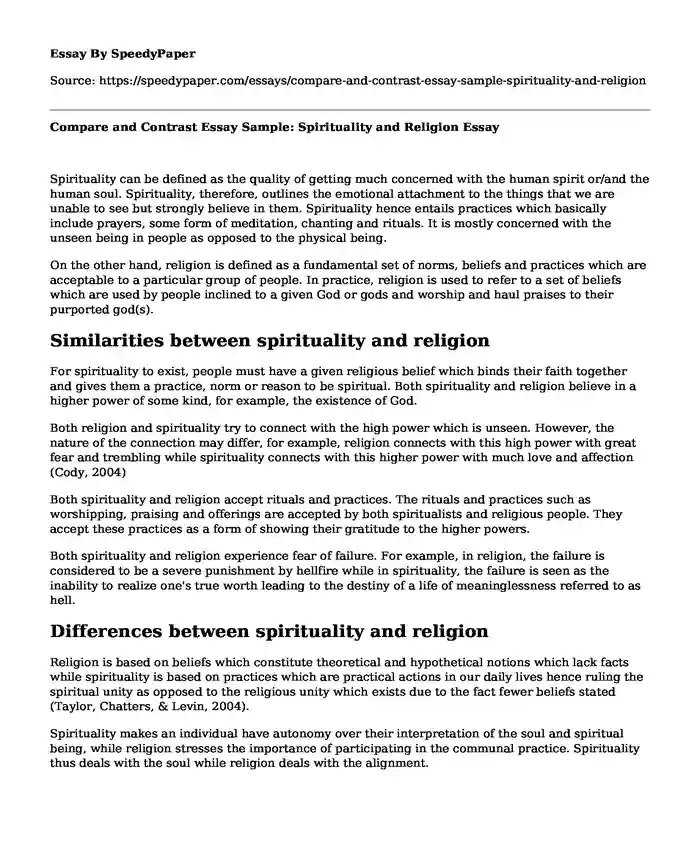Spirituality can be defined as the quality of getting much concerned with the human spirit or/and the human soul. Spirituality, therefore, outlines the emotional attachment to the things that we are unable to see but strongly believe in them. Spirituality hence entails practices which basically include prayers, some form of meditation, chanting and rituals. It is mostly concerned with the unseen being in people as opposed to the physical being.
On the other hand, religion is defined as a fundamental set of norms, beliefs and practices which are acceptable to a particular group of people. In practice, religion is used to refer to a set of beliefs which are used by people inclined to a given God or gods and worship and haul praises to their purported god(s).
Similarities between spirituality and religion
For spirituality to exist, people must have a given religious belief which binds their faith together and gives them a practice, norm or reason to be spiritual. Both spirituality and religion believe in a higher power of some kind, for example, the existence of God.
Both religion and spirituality try to connect with the high power which is unseen. However, the nature of the connection may differ, for example, religion connects with this high power with great fear and trembling while spirituality connects with this higher power with much love and affection (Cody, 2004)
Both spirituality and religion accept rituals and practices. The rituals and practices such as worshipping, praising and offerings are accepted by both spiritualists and religious people. They accept these practices as a form of showing their gratitude to the higher powers.
Both spirituality and religion experience fear of failure. For example, in religion, the failure is considered to be a severe punishment by hellfire while in spirituality, the failure is seen as the inability to realize one's true worth leading to the destiny of a life of meaninglessness referred to as hell.
Differences between spirituality and religion
Religion is based on beliefs which constitute theoretical and hypothetical notions which lack facts while spirituality is based on practices which are practical actions in our daily lives hence ruling the spiritual unity as opposed to the religious unity which exists due to the fact fewer beliefs stated (Taylor, Chatters, & Levin, 2004).
Spirituality makes an individual have autonomy over their interpretation of the soul and spiritual being, while religion stresses the importance of participating in the communal practice. Spirituality thus deals with the soul while religion deals with the alignment.
Poll and Smith's Model of Spiritual Identity
According to the poll and Smith's model, spiritual identity manifests in four stages with each stage critical for the existence of the next stage. Poll and Smith asserts that these stages are hierarchical and hence none of them can be bypassed. The stages include;
Pre-awareness stage
This is the initial stage in the spiritual identity. Individuals struggle a lot to understand the fact that they are becoming spiritual as they struggle with some external factors such as what others will say about them. It is a very hard stage and therefore an individual is not aware of whether they are truly spiritual or it is just an illusion as noted by (Hays & Erford, 2014)
Awakening stage
Immediately, the conflict of spirituality awareness ends in an individual, the reality starts to dawn on them that they are spiritual and hence they start to understand themselves freakily.
Recognition stage
At this stage, an individual starts to generalize new spiritual learning across all the settings. They are able to integrate their spiritual selves into their self-concepts and interact freely with others without any fears.
Integration stage
This is the last stage of spiritual identity according to poll and Smith. It is a stage where an individual has discovered their beings and have accepted their positions hence making them to authentically interact with others.
Conclusion
Generally, spirituality and religion are two terms which have been abused by many speakers since they use them synonymously yet they mean different things. It is important for people to understand differences in their meanings.
References
Cody, P. (2004). Seeds of the Word =: Nga kakano o te Kupu : the meeting of Maori spirituality and Christianity. Wellington, N.Z: Steele Roberts.
Hays, D. G., & Erford, B. T. (2014). Developing multicultural counseling competence: A systems approach. Boston: Pearson.
Taylor, R. J., Chatters, L. M., & Levin, J. S. (2004). Religion in the lives of African Americans: Social, psychological, and health perspectives. Thousand Oaks: Sage Publications.
Cite this page
Compare and Contrast Essay Sample: Spirituality and Religion. (2022, Jul 20). Retrieved from https://speedypaper.com/essays/compare-and-contrast-essay-sample-spirituality-and-religion
Request Removal
If you are the original author of this essay and no longer wish to have it published on the SpeedyPaper website, please click below to request its removal:
- Free Essay: Female Sex Offender Risk Assessment
- Engaging Current Religious Tension in the News, Free Essay Sample
- Research Paper Sample on Catheter-Associated UTIs
- Essay Example in Social Psychology: Reducing Prejudice
- 2.Theoritical background 4 pts
- Free Essay: the Effects of Background Television on the Toy Play Behavior of Children
- Free Essay: What Critical Metrics Does Your CEO Focuses On?
Popular categories





